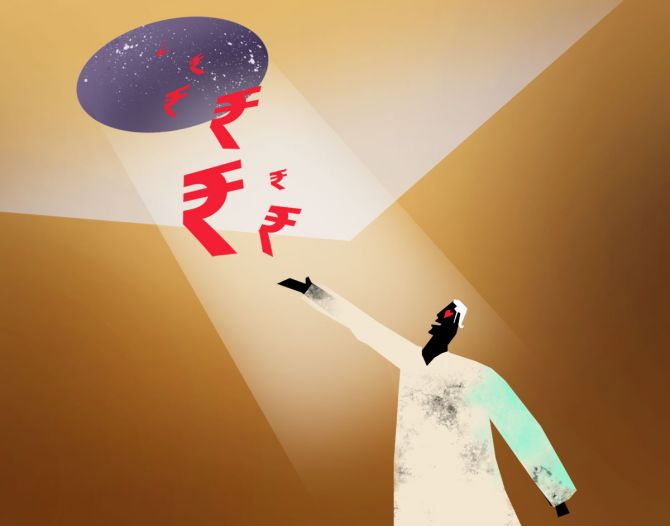Indian economy is projected to grow at 7 per cent -- the fastest among major economies across the world -- in the current fiscal year, underpinned by a sustained strengthening of macroeconomic fundamentals, the Reserve Bank of India (RBI) said in its latest annual report on Thursday.

While the central bank expected headline inflation to moderate further, it flagged risks to food inflation saying that it remains vulnerable to supply-side shocks.
The RBI's balance sheet size surged 11.08 per cent to Rs 70.48 lakh crore (about $845 billion) as of March 31, 2024.
This was nearly 2.5 times that of Pakistan's entire GDP of close to $340 billion.
The Indian economy, it said, expanded at a robust pace in 2023-24 (April 2023 to March 2024 financial year), with real GDP growth accelerating to 7.6 per cent from 7.0 per cent in the previous year -- the third consecutive year of 7 per cent or above growth pace.
The economy showed resilience in FY24 (2023-24 fiscal) despite persistent headwinds.
The GDP growth is robust on the back of solid investment demand which is supported by healthy balance sheets of banks and corporates, the government's focus on capital expenditure and prudent monetary, regulatory and fiscal policies, it said, adding the Indian economy is navigating the drag from an adverse global macroeconomic and financial environment.
Also, MSPs for both kharif and rabi seasons 2023-24 ensured a minimum return of 50 per cent over cost of production for all crops, it said.
Indian economy, the report said, is well-placed to step up growth trajectory over the next decade in an environment of macroeconomic and financial stability.
"As headline inflation eases towards the target, it will spur consumption demand especially in rural areas," it said.
It further said the external sector's strength and buffers in the form of foreign exchange reserves will insulate domestic economic activity from global spillovers.
The report, however, added that geopolitical tensions, geoeconomic fragmentation, global financial market volatility, international commodity price movements and erratic weather developments pose downside risks to the growth outlook and upside risks to the inflation outlook.
"The real GDP growth for 2024-25 is projected at 7.0 per cent with risks evenly balanced," it said.
On its finances, RBI said its balance sheet in FY23 (April 2022 to March 2023) stood at Rs 63.44 lakh crore.
With finances normalised to pre-pandemic level, RBI said its balance sheet increased to 24.1 per cent of India's GDP at end of March 2024 from 23.5 per cent a year back.
The central bank's income rose 17.04 per cent in FY24 while expenditure reduced by 56.3 per cent.
This together with a jump in interest income from foreign securities led to RBI's surplus surging by 141.23 per cent to Rs 2.11 lakh crore, which it transferred to the central government last week.
In addition, the RBI provided Rs 42,820 crore towards the contingency fund in FY24.
The RBI saw a gain of Rs 83,616 crore from foreign exchange transactions during the year, while interest income from foreign securities rose to Rs 65,328 crore, which allowed it to increase the size of its contingency fund.
The annual report is a statutory report of the RBI's central board of directors.
The report covers the working and functions of the Reserve Bank of India for the April 2023-March 2024 period.
In the financial sector, RBI said unclaimed deposits with banks witnessed a 26 per cent jump year on year to Rs 78,213 crore at the end of March 2024 while the amount with the Depositor Education and Awareness Fund stood at Rs 62,225 crore.
Banks including cooperative banks transfer unclaimed deposits of account holders lying in their accounts for 10 or more years to RBI's Depositor Education and Awareness (DEA) Fund.
The number of frauds in the banking sector went up to 36,075 in 2023-24 year-on-year, but the amount involved reduced by 46.7 per cent to Rs 13,930 crore, the report said.
The RBI report also said that with an aim to curb frauds and enhance the payment experience further, the introduction of real-time payee name validation before the actual fund transfer will be explored in compliance with newly enacted 'The Digital Personal Data Protection Act, 2023'.
During 2023-24, the amount involved in frauds was Rs 13,930 crore, down from Rs 26,127 crore a year ago.
The number of frauds increased to 36,075 during 2023-24 from 13,564 in the preceding financial year.
An assessment of bank group-wise fraud cases over the last three years indicates that while private sector banks reported maximum number of frauds, public sector lenders continued to contribute maximum to the fraud amount, said the Annual Report for 2023-24.
"Frauds have occurred predominantly in the category of digital payments (card/internet), in terms of number.
In terms of value, frauds have been reported primarily in the loan portfolio (advances category)," the report said.
While small value card/internet frauds contributed maximum to the number of frauds reported by the private sector banks, the frauds in public sector banks were mainly in loan portfolios.
Further, an analysis of the vintage of frauds reported during 2022-23 and 2023-24 shows a significant time-lag between the date of occurrence of a fraud and its detection.
"The amount involved in frauds that occurred in previous financial years formed 94 per cent of the frauds reported in 2022-23 in terms of value," the report said.
Similarly, 89.2 per cent of the frauds reported in 2023-24 by value occurred in previous financial years.
The annual report for 2023-24 said that the Indian economy is navigating the drag from an adverse global macroeconomic and financial environment.
The Indian economy, the report said, is well-placed to step up growth trajectory over the next decade in an environment of macroeconomic and financial stability.
"As headline inflation eases towards the target, it will spur consumption demand especially in rural areas," it said.
Headline inflation softened to 5.4 per cent during 2023-24 from 6.7 per cent, driven by the fall in core inflation -- consumer price index or CPI excluding food and fuel -- to 4.3 per cent from 6.1 per cent a year back.
According to RBI, the external sector's strength and buffers through foreign exchange reserves will insulate the local economic activity from global spillovers.
"Geopolitical tensions, geoeconomic fragmentation, global financial market volatility, international commodity price movements and erratic weather developments pose downside risks to the growth outlook and upside risks to the inflation outlook," it said.
The RBI also emphasised that the Indian economy would have to navigate challenges posed by rapid adoption of AI/ML (artificial intelligence/machine learning) technologies as well as recurrent climate shocks.











 © 2025
© 2025